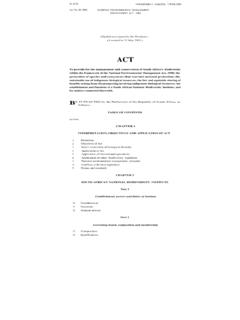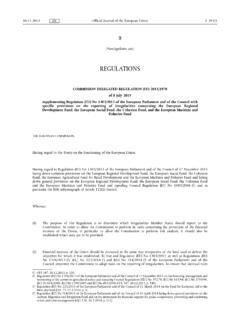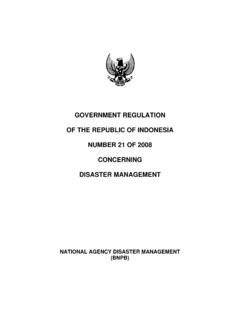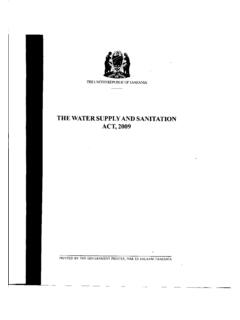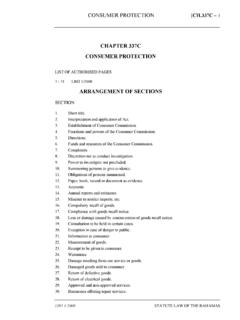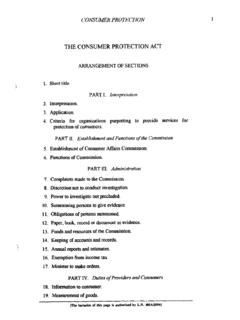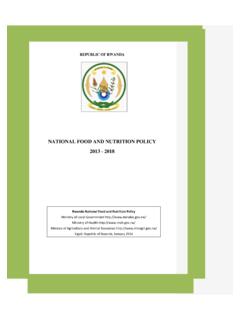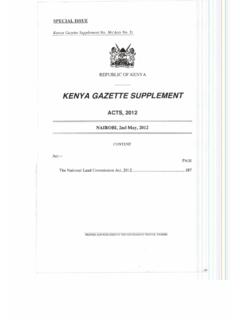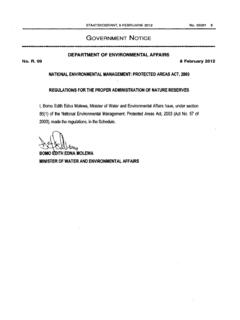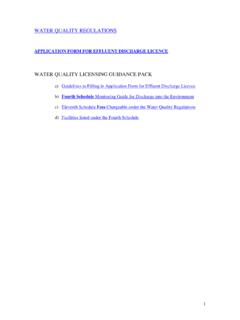Transcription of NATIONAL GENDER POLICY, NIGERIA
1 NATIONAL GENDER policy STRATEGIC FRAMEWORK (IMPLEMENTATION PLAN) FEDERAL REPUBLIC OF NIGERIA 2008 2013 AUGUST 2008 2 TABLE OF CONTENTS PAGE Acronyms ii Introduction 3 Overarching Principles 4 Strategic development Results Framework 7 Baseline Indicators Framework 17 Managing for Results and Reporting Framework 19 Five Year Indicative Budget 21 ANNEXES ANNEX I: NATIONAL GENDER MANAGEMENT SYSTEM ANNEX II: MANAGING FOR RESULTS AND REPORTING FRAMEWORK ANNEX III: LIST OF STAKEHOLDERS CONSULTED 3 ACKNOWLEDGMENT This Strategic development Results Framework, designed for implementing the NIGERIA NATIONAL GENDER policy is the product of an intensive consultative process and hard work by several individuals and institutions.
2 The process lasted for 8 months, after the approval of the NATIONAL GENDER policy by the Federal Executive Council in 2006. The development of the Strategic Results development Framework commenced in January 2008 with a series of consultations that culminated into a survey exercise which assessed the level of preparedness of the government institutions for implementing the GENDER policy as well as to identify gaps in programming around GENDER issues. The Federal Ministry of Women Affairs and Social development would like to acknowledge the strategic role played by the canadian international development agency (CIDA), and in particular, it s GENDER Advisor, Ms.
3 Esther Eghobamien, in facilitating and supporting the Federal Ministry of Women Affairs and Social development in the take off of the process for the development of the Strategic framework. We would also like to acknowledge the support of Ms. Amina Ibrahim, the Senior Special Assistant to the President on the Millennium development Goals, and Desk Officer, GENDER & Youth in the Office of the Senior Special Assistant to the President-MDGs, Ms Olufunke Baruwa. We would also like to acknowledge the technical expertise of Ms.
4 Funmi Balogun- Alexander and Ms. Adebanke Akinrimisi for leading the process for the development of the implementation framework. The contributions of the GENDER Focal Persons from development Partners, Ministries, Parastatals and NGOs that participated in the initial survey that informed the proposed GENDER management system are highly appreciated they include Ms. Ifeoma Nwankwo, Federal Ministry of Labour; Mr. Odesanya Kolawole, Federal Ministry of Commerce & Industry; Ms. Umoren, Federal Ministry of Justice; Lady Nancy Oghenekaro, Federal Ministry of Information; Ms.
5 Okafor, Federal Ministry of Education; Ms. Adenike Etta, Federal Ministry of Health; Nwakama, NATIONAL Human Rights Commission; Ms. Patricia Eweama, NATIONAL Bureau of Statistics; Mr. Joshua Abu, NATIONAL Orientation agency ; Ms. Rita Onyali, Federal Character Commission; Ms. Mary Isong, NATIONAL Planning Commission; Dr. Kayode Ogungbemi, NATIONAL agency for the Control of AIDS; Mr. Ken Ozomena of UNICEF; Ms. Tolu Lewis-Tamoka of UNIFEM; Mr. Graham Gass of the UK Department for international development (DFID); Ms. Priscilla Ankut, EC Delegation; Ms.
6 Joy Ezeilo, Women Aid Collective (WACOL); Ms. Oby Nwankwo, Civil Resource development and Documentation Centre; Ms. Abiola Akiode-Afolabi, WARDC; Ms. Ada Agina, GENDER and development Action; The Ministry also acknowledges the contributions of all men and women from across the country that participated in the Peer Review and Stakeholders meetings held at Abuja for the purpose of finalizing and adopting the framework, including the Honourable Commissioners for Women Affairs that attended the Stakeholders meeting held on August 15, 2008.
7 The Federal Ministry of Women Affairs & Social development Abuja. August 2008. 4 ACRONYMS AIDS Acquired Immune Deficiency Syndrome APPRRW Protocol to the African Charter on Human and Peoples Rights on the Rights of Women in Africa CEDAW Convention on the Elimination of all forms of Discrimination against Women CSOs Civil Society Organisations CRA Child s Rights Act DWA Director of Women Affairs FCT Federal Capital Territory FGM Female Genital Mutilation FMoWASD Federal Ministry of Women Affairs and Social development GFPs GENDER Focal Points HIV Human Immunodeficiency Virus INEC Independent
8 NATIONAL Electoral Commission MDGs Millennium development Goals MWA&SD States Ministry of Women Affairs & Social development NACA NATIONAL agency for the Control of AIDS NCWD NATIONAL Centre for Women development NERDC NIGERIA Education Research and development Council NGP NATIONAL GENDER policy NOA NATIONAL Orientation agency SACA State agency for the Control of AIDS SGBV Sexual and GENDER Based Violence SIEC States Independent Electoral Commission UN United Nations WACOL Women Aid Collective WANEP West Africa Network for Peacebuilding 5 SECTION I PROCESS development OF THE STRATEGIC RESULTS FRAMEWORK The process for the development of a strategic framework for the implementation of the NATIONAL GENDER policy was started in August 2007 following the approval of the NATIONAL GENDER policy for NIGERIA by the Federal Executive Council in 2006.
9 Two Consultants with requisite skills for the assignment were recruited with the support of the canadian international development agency (CIDA) to harmonize the process and provide the framework in consultations with all the critical stakeholders on GENDER equality in NIGERIA . The development of the Strategic development Results Framework, including the NATIONAL GENDER policy GENDER Management System and the Monitoring and Reporting Framework was preceded by a survey to review the preparedness of government ministries, Parastatals, commissions as well as development agencies and the private sector, in the implementation of the NATIONAL GENDER policy .
10 The Survey Results are presented as a separate document. The Strategic Framework included the Desk Review of existing GENDER Policies from around the world, including lessons from the Commonwealth Secretariat on the development of a GENDER Management System, the development of research instruments for gathering information from stakeholders, different consultations (electronic, meetings, workshops) with different stakeholders (Federal/State government ministries, Parastatals, commissions, development partners, UN agencies, etc.)
